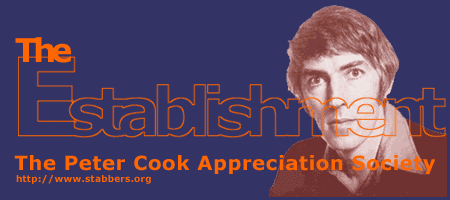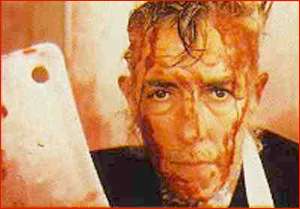|
After his return from America, Cook was left with
seemingly nothing to do and nowhere to go. Moore had effectively
called off their partnership and, without the fall back of the double
act, he felt somewhat adrift.
After a small part in a forgettable film, Find
The Lady (1976), Cook turned his mind to back to the double
act, more specifically to some old tapes he and Dudley had done
mainly for themselves and a couple of friends. The recording sessions,
which took place in 1973 during the Behind The Fridge tour,
had a rough, improvised feel and would cover topics that Pete and
Dud could never have done before a normal mainstream audience, and
were primarily done as a rest from the scripted, crowd-friendly
nature of the 'Fridge performances. The language was often
obscene, sketches would be broken up by filthy songs, and the flights
of fancy would be completely absurd and scatological. The main characters
were essentially the Pete and Dud of the Dagenham Dialogues,
re-christened Derek (Moore) and Clive (Cook), but
much angrier, with more swearing and gynaecological references.
The tapes recorded, first in front of a selected
audience then again in a recording studio [it now appears
Cook & Moore may have first recorded Derek & Clive
material in London - see Pub &
Bed #22 for further details], Cook and Moore thought
little of them until they noticed that they were beginning to do
go round on bootleg and were becoming quite popular in their own
right. Island Records eventually released a proper album of the
sessions, Derek And Clive(Live) (1976) and, much to everyone's
surprise, it was a huge hit and renewed interest in the Cook and
Moore double act, now re-invented as aggressive rebellious comedians
with a new potential youth market. Cook was very enthusiastic about
the new venture, but Moore was less so, fearing that it would damage
his chances of making it as a film star in Hollywood, although he
needn't have worried - it was the publicity following the Derek
And Clive albums that convinced Chevy Chase that Moore was a
bankable actor when he suggested him for the film Foul Play (1978),
Moore's first big movie hit. As it was, Moore's Hollywood career
in 1976 was not taking off as he had hoped and he reluctantly came
home to help Cook promote the album. Apart from that, the only other
performance they made together that year was as guest hosts of the
American comedy show Saturday Night Live (1976).
1977 started off well for Cook. He was writing a
weekly column for The Daily Mail called Peter Cook's Monday
Morning Feeling, and working with Moore again. They performed
at a number of galas, all old material, and the two were working
on the script for a new film, The Hound Of The Baskervilles (released
1978). As shooting began for the film, however, things began to
go wrong. The director chosen was Paul Morrisey, a protégé
of Andy Warhol's Factory and keen fan of British comedy films, especially
the Carry On series. He insisted that he be allowed to re-write
the original script, putting in what he must have thought was good
bawdy British innuendo but which was, in fact, crass rubbish. Cook
and Moore were also, at Morrisey's behest, forced to re-enact many
of their older sketches, none of which worked and most were eventually
removed, apart from a terrible rendition of One Leg Too Few.
Morrisey's directing style, which relied on improvisation and actors
'finding' their characters was at complete variance with the Carry
On style of quick-fire gags, comic reactions and quick cutting,
and the whole approach was at variance with Cook and Moore's entire
style, which was based on characterisation, observation, wit and
a dollop of whimsy. To add to the misery, Morrisey came down with
hepatitis and filming was delayed, robbing the film of what little
momentum it may have had. The film remains torture to watch [See
P&B #20].
During the filming of The Hound, Cook was
also involved in a recording project with Godley and Creme, which
became a triple album, Consequences (1977), released on Phonogram
Records. It was a concept album, musically based around Godley and
Creme's invention The Gizmo, which clamped to neck of a guitar and
made strange noises. Cook provided a narrative play for the album,
set around the divorce of Mr and Mrs Stapleton and the eviction
of the Wisty-esque Mr Blint. Whatever the merits of the album and
play, the album bombed. While Godley and Creme and Cook were locked
away recording it, punk took over the rock world and the idea of
releasing a triple album based around a narrative play and something
with a name as stupid as The Gizmo looked ridiculous and sold virtually
nothing.
Cook and Moore returned to the recording studio
to make the second album Derek and Clive album, Derek And Clive
Come Again (1977), released on Virgin records. This was the
first full-on D&C album and presented an even harsher, bleaker,
weirder, and more obscene form of comedy than the first album. It
is also, if you are prepared to go along with it, one of the most
savagely funny albums ever made. Dialogues revolve around such subjects
as the availability of hamburgers up Joan Crawford's cunt, a man
who became a carpet, northern comic Alfie Noakes, wanking over Clement
Attlee and a competition to see who's got the most cancer. There's
little point in us writing a spirited defense of Derek And Clive
here, the material isn't remotely interested in being defended.
For some, Derek and Clive represent the ugly, unworthy end of a
once wonderful partnership, for others it's comic ecstasy, improvised
lyrical comedic scatology, for others it's two pissed blokes being
very rude and very funny. Make your own mind up.
Derek and Clive brought Cook to the notice of the
new punk audience and he was chosen to present the ATV series Revolver
(July-September 1978). In the guise of an old-fashioned dance hall
proprietor, Cook would introduce bands such as The Buzzcocks, X-Ray
Spex and a young XTC from a giant screen in the studio, royally
slagging off each band as they came and went [See
P&B #17, for Cook and The Sex Pistols see
P&B #12].
The third Derek and Clive album, Ad Nauseum
(1978), was released on Virgin again, and was much in the same vein
as Come Again, although possibly lacking some of the second
album's creative energy. Highlights include a horse racing commentary,
a discussion of who makes you more horny, a dead pope or Lord Longford,
the worst impression of Bruce Forsyth known to man, and The Critics,
a sketch parodying Derek and Clive's detractors. The best sketch,
though, has to be The Horn, which goes on for ages, goes absolutely
nowhere, and is quite wonderful. For me, some of the comic invention
of Come Again had been replaced here by an over-reliance
on 'shock tactics' such as the use of overtly racist language and
graphic misogynist imagery, but for others it is precisely the extreme
nature of the material on this album that makes it superior to it's
predecessor. Once again, listen to it and reach your own conclusions.
Some of the Ad Nauseum sessions were filmed
for Derek And Clive Get The Horn (released 1980), which Cook
was keen to release but Moore, who hated the film, refused; in addition
The British Board of Film Censors would not give it a certificate.
Cook got around the BBFC by trying to release the film on home video
and, while Moore still managed to block it in America, it did come
out in Britain some two years after it was made. The videos were
then seized by the Greater Manchester Police under obscenity laws,
and distribution was held up. Meanwhile the distribution company
for the video went bankrupt and copies were taken as assets. Next
to no copies were sold and the film was to remain unre-released
until 1993. Cook and Moore's disagreement about the nature of the
material in Ad Nauseum and the fight over the release of
Get The Horn marked the final blow for their double act and
they parted company.
The next twelve months was a largely fragmented
period for Cook, with one shining highlight. The fragments included
playing Prince Disgusting in the Cambridge Footlights radio pantomime
Black Cinderella 2 Goes East (December 1978 Radio 4), devised
by Douglas Adams and written by Clive Anderson and Rory McGrath,
and a role as Count Yourchickens in a radio pilot called Tales
From The Crypt (1979) by Rory McGrath and Griff Rhys Jones.
While no series was commissioned from the latter, the programme
may or may not bare a resemblance to the album Glompus Van Der
Hloed's Tales From The Crypt by McGrath and Jimmy Mulville,
which starred Andrew Sachs. Cook also took part in a series of interviews
with David Dimbleby, Person To Person (1979), which took
a distinctly aggressive turn when Dimbleby began pointing out the
present lull in Cook's career.
But the shining highlight of 1979 was a hastily
cobbled together sketch called Entirely A Matter For You,
written for an Amnesty stage show The Secret Policeman's Ball,
featuring Cook [See P&B
#18]. He had done two previous Amnesty Shows, A Poke
In The Eye With A Sharp Stick (1976), which was released as
the film Pleasure At Her Majesty's (1977), and The Mermaid Frolics
(1977), recycling old material for both shows. At The Secret
Policeman's Ball, legend has it, one of the first-night reviewers
pointed out that the programme was once again just full of old Cook
and Monty Python sketches and was just a bit cosy instead
of being bitingly satirical. Cook said something to the effect of
"Right, if they want satire, I'll give it to 'em," and
rushed off to write a parody of the judge's summing up in the Jeremy
Thorpe trial. The sketch, written by Cook and performed alone, is
simply one of the greatest pieces of comedy ever conceived, by Cook
or anyone else. We've tried not to get too gushing about things
so far in this biography thing, but this one piece is an absolute
triumph. Every sentence contains at least one fantastic gag, often
more, but constructed in such a way that one never feels the pudding
to be over egged. It is simply the most beautiful comedy prose you
will ever hear, so there. A record of the sketch, Here Comes
The Judge (1979) was released by Virgin on a mini-LP, along
with some sketches performed with Not The Nine O'Clock News
producer John Lloyd, and the piece formed part of the film of the
Amnesty Show, called The Secret Policeman's Ball (1980).
Cook now turned his attention back to television
and, after a brief appearance in Spike Milligan's Q9 (8 September
1980), made his first solo hit TV show, Peter Cook & Co
(1980) [See P&B #14].
The show contained nearly all new material, written by Cook and
Bernard McKenna, including a wonderful piss-take of Roald Dahl ("Ronald
was a pretty ordinary name and, until I dropped the 'n', nobody
took a blind bit of notice"), a mad German ant expert, and
a grand finale featuring E.L. Wisty's song Lovely Lady Of The
Roses. Critical response was good, especially in America, and
the possibility of a series came up, but Cook decided to commit
to a new American sitcom he had been in two pilot shows for. The
US series was slow to take off the ground, so to fill in time began
negotiations for a new film script with McKenna and Graham Chapman,
and wrote the foreword for Paula Yates's book Rock Stars In Their
Underpants (1980).
The American sitcom, The
Two Of Us (1981-82 CBS), an American version of the British
Two's Company, was given two more pilots before the series
was commissioned. The show cast Cook as an English butler to Mimi
Kennedy as his American employer. Very much an average US sitcom,
the ratings were, at first, rather healthy, but soon plummeted out
of the top forty and the show was dropped by the end of the first
series. The show was later repeated in Britain (1983-84 ITV).
Yellowbeard (1983), the film Cook wrote with
Bernard McKenna and Graham Chapman, was finally released, but only
served to add itself to the list of Cook's cinema failures [See
P&B #15]. The plot concerned the titular pirate,
played by Chapman, whose bastard son had been brought up by an unwitting
aristocrat, Lord Lambourne, played by Cook. It was a confused film,
with occasional brilliant passages but, on the whole, not good.
In addition to this, there would seem to be a film directed by Michael
Mileham and Phillip Schuman called Group Madness (1983),
which, one supposes, is a behind-the-scenes style look at the making
of Yellowbeard. To be honest we've no idea, we've only seen a reference
to it on the Internet Movie Database. If anyone has a clue what
this is about, please drop us a line.
Cook performed in another charity show, An Evening
At Court (1983) at the Theatre Royal, this time to raise funds
for a former Cambridge friend Adrian Slade. For the show Cook wrote
a new Wisty sketch, performed by himself and John Cleese, called
Inalienable Rights [See
P&B #15]. From this he landed a regular spot on the
1983 run of Russell Harty And Friends delivering Wisty monologues
as he had done in On The Braden Beat, and he appeared later
the same year in a cameo as Richard III in the first series of The
Black Adder. He also had a part as a maths teacher turned villain
in the film Supergirl (1984), but we really don't want to
think about that.
He made another live performance in The Nether
Wallop Arts Festival (1984). He appeared in one sketch, with
Mel Smith, in a tin hut in a field in the Hampshire village. The
sketch was called The Lesbian Synchronised Swimmers and was,
apparently, in rehearsals, a very funny, witty piece of writing
by Smith and Cook. On the day itself, though, the two men had far
too much to drink before going on stage and consequently forgot
their lines and were forced to improvise their way through a completely
new routine.
The year 1985 saw a number of cameos and guest appearances
on such shows as Bob Monkhouse's Comedy Showcase (BBC1),
Who Dares Wins (Channel 4) and Kenny Everett's Christmas
Carol (BBC1), as well dusting off E.L. Wisty again for two series
of Twenty Years On (1985-86), a look back at the '60s hosted
by David Frost. A low point came in 1986 with the BBC1's Can
We Talk, a terrible chat show hosted by Joan Rivers where Cook
acted the part of resident guest and supposed foil to Rivers' supposed
wit. Cook just sat there looking miserable throughout each show.
The only possible benefit of the show was that it briefly re-united
Cook and Moore as guests.
The highlight of this rather drab passage in Cook's
professional life was his edition of Saturday Live (1986
Channel 4). Cook's contribution consisted of entirely new material,
although some of it repeated themes of previous sketches, and Cook
appeared re-vitalised as a comic force. There was an impression,
or rather an interpretation, of Ferdinand Marcos, another 'Wisty
on a bench with a stranger' sketch, this time with John Fortune,
a slightly naff sketch with John Bird and Cook as a couple of builders,
and a return to Cook's roots with an impression of an elderly Harold
Macmillan, now called Lord Stockton. Best of all is a wonderful
extended flight of fancy with Cook as bandleader James Last touring
Britain. A wonderful, never repeated piece of work [See
P&B #20].
Film cameos and talk shows continued to support
Cook, including the part of British Prime Minister Sir Mortimer
Chris in the cinema transfer of TV's Whoops Apocalypse (1986),
a rather OTT political satire, the part of a bishop in Rob Reiner's
The Princess Bride (1987), which was surprisingly similar
to his bishop in the The Making Of A Movie sketch from Not
Only... But Also, and Without A Clue (1988), a Sherlock
Holmes spoof with a nice small part for Cook. Best of all, though,
was the title role in The Comic Strip Presents... Mr Jolly Lives
Next Door (1987). Cook played Jolly, a professional killer of
some never-clearly-defined description who happens to have an office
next door to Rik Mayall and Adrian Edmonson's escort agency. The
film is a kind of link between Mayall and Edmonson's Dangerous
Brothers and Bottom and really centres around them, but
Cook is excellent and seems to relish in the goriness of his role.
A number of projects drifted away in a haze of manyana
and missed deadlines, such as The Dark Horse From The Grass Roots,
a fictional documentary based around a Ross Perot-esque presidential
candidate Morton P Fergelburger (Cook). As Cook entered the last
phase of his life, belief and interest in Cook as a writer and performer
began to wane but, as he was to prove, he could still sparkle when
he mustered the effort.
go to
part four
|


